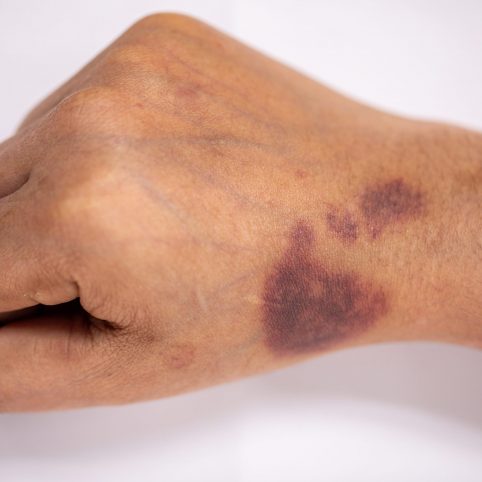Joint and Muscle Bleeds
With the use of prophylaxis, the number of joint bleeds that happen in a year are very few, even in those with severe haemophilia. This has significant benefits for the long term protection and function of joints.
What does a bleed feel like?
A bleed into a joint, if untreated, can go on for days. The first sign is a feeling of tightness in the joint but no real pain. The joint may feel a little puffy to the touch. If untreated, the joint may become hot to the touch. Using full range of motion of the joint can become very painful. If the bleed is in a lower limb, weight bearing becomes difficult.
Usually, the joint becomes visibly swollen. As the bleeding continues and the swelling increases, all movement in the joint is lost. After even a few bleeds like this, if left untreated, the joint can become permanently damaged.
A bleed into a muscle may not be apparent for a while. But soon there will be pain when the muscle is flexed. Swelling may become evident. Eventually, if left untreated, flexion and extension of the nearby joints will be reduced.
Do All Bleeds Need to be Treated?
For a very minor bruise or bleed, the First Aid RICE steps (rest, ice, compression and elevation) may be enough treatment. The bleed may not necessarily require treatment with clotting factor.
With the constant clotting activity provided with emicizumab, or if factor levels are high after a recent prophylactic treatment, bleeding may stop without additional treatment. When in doubt, contact your HTC.
However, any bleeding into a joint and significant bleeding into soft tissues, especially a muscle, must be treated with clotting factor. A significant soft tissue or muscle bleed is one that causes pain and limits the movement and function of nearby joints. A deep muscle bleed may not be obvious at first because the bruising or swelling is not visible right away, but if the bleeding continues, it can cause damage to nerves and blood vessels. It is therefore important to also watch for signs such as pain and loss of movement. Joint and muscle bleeds must be treated with clotting factor as soon as possible. Your care team will help explain how to recognize these bleeds.
Any injury to the head or vital organs can be very serious and needs treatment with clotting factor right away. Get medical attention as soon as possible. An injury or bleed that involves the neck, throat or chest can interfere with the airway for breathing — this can happen very suddenly. It is critical to act fast before this happens. Infuse factor, if possible, and take your child to the hospital without any delay.
For many people with mild or moderate haemophilia A, treatment with desmopressin can be enough to stop minor bleeding episodes. However, clotting factor will be needed for more serious bleeds.
How do I treat a bleed?
Epistaxis(Nose bleeds)
Nose bleeds are not very common in people with haemophilia and can be the main symptom for those with mild haemophilia. Haemophilia leads to delayed clotting therefore nose bleeds last longer and can be more frequent. They can occur most frequently in childhood and adolescents. If you experience frequent nose bleeds it may be necessary to contact your haematologist.
How do I treat nose bleeds?
Nose bleeds may be stopped by sitting upright and firmly pinching the widest part of the nostrils together for 10 to 15 minutes. It may be necessary to repeat the procedure a second time. If after 20-30 minutes of persistent bleeding it may be necessary to get medical advise. Some people find that a cold cloth placed on the back of the neck and on the bridge of the nose is helpful in stopping bleeding.
Drinking hot liquids and strenuous exercise can cause the nose bleed to re-start. Therefore, it may be helpful to avoid hot drinks and avoid lifting or straining for 24 hours after a nose bleed.
Can anything be done to prevent nose bleeds?
Yes. Maintaining a certain level of humidity in the home, especially in the individual’s bedroom can help. This is especially important in the winter when heating makes a house much drier. A humidifier is ideal; however, an open bowl of water can also work very well. Using petroleum jelly (Vaseline) in the nostrils every day can keep the nostrils from drying and cracking.
Gum Bleeding
Gums that bleed after tooth brushing are a sign of early gum disease which is very common and it is important that this does not progress to more severe gum problems. The recognised treatment is to visit your dentist or hygienist for advice and to have your teeth professionally cleaned and monitored. Your dentist may advise you to use a medicated mouthwash and will recommend methods for brushing and cleaning your teeth more effectively.
Menstrual Bleeding and child birth
Women tend to have more symptoms than men do because of the menstrual cycle and childbirth. Heavy, prolonged menstrual bleeding is the most common symptom for women with vWD. Some women have heavy bleeding throughout the normal menstrual period. This is called menorrhagia. Other women bleed unpredictably throughout the month. This is called metrorrhagia.
Medication Advice
Are there any drugs a person with haemophilia disease should not take?
Yes. Certain drugs affect the way platelets plug holes in blood vessels. A person with VWD should never take drugs containing:
• Aspirin (ASA) and any drugs containing aspirin
• Non-steroidal anti-inflammatory drugs (e.g. ibuprofen)
